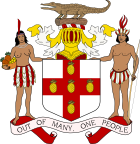Politics of Jamaica: Difference between revisions
m Disambiguated: IOM → International Organization for Migration, NAM → Non-Aligned Movement; Unlinked: Independent, WCL, WFTU, not organizations of which states are members; Help needed: CCC; see WP:ABBR |
No edit summary |
||
| Line 1: | Line 1: | ||
<big> JOIN [[JAMAICA NATIONAL HAPPY PARTY]].big> |
|||
{{Unreferenced|date=January 2008}} |
{{Unreferenced|date=January 2008}} |
||
{{Politics of Jamaica}} |
{{Politics of Jamaica}} |
||
Revision as of 20:42, 4 April 2012
JOIN JAMAICA NATIONAL HAPPY PARTY.big>
 |
|---|
|
|
The Politics of Jamaica takes place in a framework of a representative parliamentary democratic monarchy. The 1962 Constitution of Jamaica established a parliamentary system based on the United Kingdom model. As chief of state, Queen Elizabeth II appoints a governor general, on the advice of the prime minister, as her representative in Jamaica. The governor general's role is largely ceremonial. Executive power is vested in the cabinet, led by the Prime Minister. Jamaica is an independent country and Commonwealth Realm. It is a parliamentary democracy whose political and legal traditions closely follow those of the United Kingdom. Executive power is exercised by the government. Legislative power is vested in both the government and parliament. Jamaica's current Constitution was drafted in 1962 by a bipartisan joint committee of the Jamaican legislature. It came into force with the Jamaica Independence Act, 1962 of the United Kingdom Parliament, which gave Jamaica political independence. Constitutional safeguards include freedom of speech, press, worship, movement, and association. The Judiciary is independent of the executive and the legislature. Jurisprudence is based on English common law.
Executive branch
| Office | Name | Party | Since |
|---|---|---|---|
| Queen | Elizabeth II | 6 February 1952 | |
| Governor-General | Patrick Allen | 26 February 2009 | |
| Prime Minister | Portia Simpson-Miller | People's National Party | 5 January 2012 |
The 1962 Constitution established a parliamentary system based on the United Kingdom model. As chief of state, Queen Elizabeth II appoints a governor general, on the advice of the prime minister, as her representative in Jamaica. The governor general's role is largely ceremonial. Executive power is vested in the Queen, but exercised mostly by the cabinet, led by the Prime Minister.
Legislative branch
Parliament is composed of an appointed Senate and an elected House of Representatives. Thirteen Senators are nominated on the advice of the prime minister and eight on the advice of the leader of the opposition; as a two-thirds majority of both chambers is needed for major constitutional amendments, this provides a consensus requirement for significant change. General elections must be held within five years of the forming of a new government. The prime minister may ask the governor general to call elections sooner, however. The Senate may submit bills, and it also reviews legislation submitted by the House. It may not delay budget bills for more than one month or other bills for more than seven months. The prime minister and the Cabinet are selected from the Parliament. No fewer than two nor more than four members of the Cabinet must be selected from the Senate.
Political parties and elections
Template:Jamaican general election, 2011
Judicial branch
The judiciary also is modeled on the UK system. The Court of Appeal is the highest appellate court in Jamaica. Under certain circumstances, cases may be appealed to the United Kingdom's Judicial Committee of the Privy Council. Jamaica's parishes have elected councils that exercise limited powers of local government.
Firearms offenses, including possession of unlicensed guns and ammunition, are tried before a dedicated Gun Court established in 1974. The Gun Court hears cases in camera and practices jury trial only for cases of treason or murder. All other cases are tried by resident magistrates or justices of the Supreme Court of Jamaica.
Administrative divisions
Jamaica is divided in 14 parishes: Clarendon, Hanover, Kingston, Manchester, Portland, Saint Andrew, Saint Ann, Saint Catherine, Saint Elizabeth, Saint James, Saint Mary, Saint Thomas, Trelawny, Westmoreland.
International organization participation
African, Caribbean and Pacific Group of States, Caricom, CCC[disambiguation needed], Caribbean Development Bank, United Nations Economic Commission for Latin America and the Caribbean, Food and Agriculture Organization, G-15, G-33, G-77, Inter-American Development Bank, International Atomic Energy Agency, International Bank for Reconstruction and Development, International Civil Aviation Organization, International Red Cross and Red Crescent Movement, International Fund for Agricultural Development, International Finance Corporation, International Federation of Red Cross and Red Crescent Societies, International Hydrographic Organization (pending member), International Labour Organization, International Monetary Fund, International Telecommunication Union, Intelsat, Interpol, International Olympic Committee, International Organization for Migration (observer), International Organization for Standardization, International Telecommunication Union, Latin American Economic System, Non-Aligned Movement, Organization of American States, OPANAL, Organisation for the Prohibition of Chemical Weapons, United Nations, UN Security Council (temporary), United Nations Conference on Trade and Development, UNESCO, United Nations Industrial Development Organization, Universal Postal Union, World Health Organization, World Intellectual Property Organization, World Meteorological Organization, World Tourism Organization, World Trade Organization
See also
References
